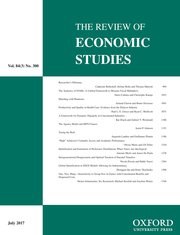
Rossi, P. (2019). Strategic Choices in Polygamous Households: Theory and Evidence from Senegal Review of Economic Studies, 86(3):1332–1370.
-
Affiliated authorPauline Rossi
-
Publication year2019
-
JournalReview of Economic Studies
This article proposes a strategic framework to account for fertility choices in polygamous households. It uses unique data on fertility histories of a representative sample of co-wives in Senegal to estimate a duration model of birth intervals with individual baseline hazards. Exploiting entries and exits of co-wives as well as gender of births, empirical tests show that children are strategic complements. One wife raises her fertility in response to an increase by the other wife, because children are the best claim to resources controlled by the husband. This result is the first quantitative evidence that the competition between co-wives drives fertility upwards. It suggests that polygamy undermines the fertility transition in Sub-Saharan Africa by incentivizing women to want many children. This article is also one of the few attempts to open the black box of non-nuclear families, placing strategic interactions at the heart of household decision-making.